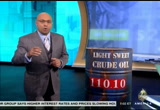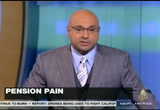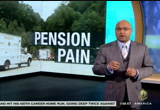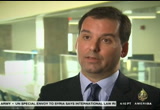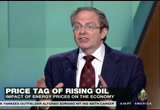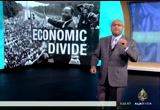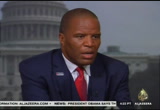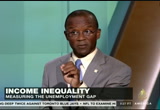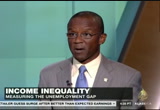tv Real Money With Ali Velshi Al Jazeera August 28, 2013 7:00pm-7:31pm EDT
7:01 pm
>> for nearly two weeks fire crews have been battling the fire around yosemite national park. crews are using a drone to fly over the massive blaze to look for flames breaking out. the family of a florida teenager is suing the miami beach and the city hsaying that the police usd excessive force when they tased the teenager and for refusing to giving the teen proper medical care. >> tensions in syria drive u.s. oil prices to a two-year high sending prices higher and threatening to derail the economic recovery. i talked to someone who said
7:02 pm
that might an good thing. and looking at a city going through drastic measures to pay its bills. and we look at the march for equality. i'm ali velshi, and this is "real money." [♪ music ] >> this is real money. you're the most important part of the show. join our conversation by ewing the #aj. u.s. oil features to which your gas prices are closely tied settled at $110.10 a barely in
7:04 pm
>> soil up on fears of a conflict, not because of supply and demand. america produces 10 million barrels of oil a day. we consume double that, but globally the world produces and uses 89 million barrels of oil a day, and 30% of that comes from the middle east. so it's oil traders, speculators who are to blame for driving up the price of oil. this week right now there is absolutely no supply problem on oil. today on twitter and facebook i've been asking you how would a spike in gas prices change your spending habits? on facebook canner ara writes, there would absolutely be less money for groceries and going out. the discretionary spending that
7:05 pm
supports my economy takes the first hit. this viewer said i would have to find a new job. i already have taken a pay cut and i'm low on cash now. the commute would exacerbate the costs. tweet us or leave us a question on facebook. maybe these increasing oil prices b which by the way has st this country in a recession in previous decades, might not be a bad thing. detroit's bankruptcy has sent off a huge legal battle over pensions that it owes its workers. many other american cities have so-called underfunded pensions. some are leaning on taxpayers to make up the difference. i'll show you how charleston, west virginia, is raising revenues and cutting costs so it can pay its pensions.
7:06 pm
>> reporter: the city is about to impose .005 cents sales tax and is charging everyone a $2 a week fee. >> we've got that story and much more as real money continues. keep it right here. antonio mora brings you smart conversation that challenges the status quo with unexpected opinions and a fresh outlook. including yours.
7:08 pm
>> bankruptcy hearings resumed in detroit and has folks i with underfunded pensions worried. that's forcing some local governments to turn to taxpayers who were not supposed to be on the hook for pensions to shell out more money. reporting on one west virginia city taking extraordinary steps to stay out of bankruptcy and to
7:09 pm
keep those pensioners paid. >> reporter: charleston, west virginia, first responders dealing today with a barricaded gunman. after 20 years on the job they have access to healthcare and are guaranteed generous pensions. >> oh, it's sweet. you could retire with $50,000 a year for life. >> reporter: but the residents are dealing with the payout that could easily exceed $1 million for each retiree. there the is so little fun that they're dipping in their general fund to keep the pensioners paid, and that general fund used to pay for street keening and salaries. >> we were paying 8% of our budgets into these retirement pensions. now we're paying 11.3% and it
7:10 pm
will go out. >> reporter: the mayor stopped payout to the pension fund, in 2009 charleston had one of the country's worst funded pensions. it only had $0.24 for every dollar it promised to pay retirees. in all, the 100 largest cities in america were underfunded by $9 billion. and standar standard and standa. >> pensions were close to 100% funded and there are genius benefits given during the budgetary stress of the great recessions so systems contributed less than they needed to. >> reporter: now taken together the 50 states have just $0.48 for every pension dollar they promised. that money has to be repaid.
7:11 pm
unlike 401k plans pensions guarantee a minimum monthly payment for life even if the assets and the plan sync to nothing, and in detroit even bankruptcy does not even guarantee paying the pensioners. that's why they're taking care to cut costs. >> reporter: the city is about to impose a $.0 pay tax and charge everyone who works in charleston, a new $2 a week fee. unless they reduce benefits it will be taxpayers who have to foot the bill of underfunded pensions. >> in 2013 every single state has one bill that addresses some sort of pension reform including puerto rico, which could mean more costs for employees and
7:12 pm
employers or more costs for tax payers. >> reporter: in an odd twist charleston is also considering not accepting federal grants. >> free money is free money. but it's current and no one is looking at the long-term effects of those. >> reporter: the programs look at over time pay for workers but it boosts their pension check for life. >> for every dollar we pay, we'll pay another $5 in pension. there is an impact there. >> reporter: it's an impact that many are facing. >> when i came here 20 years ago i envisioned to actually survive after i get to the age of 50 and put food on my table and pay bills. >> reporter: he has a year left before receiving a pension. he hopes the system will do as much for him as he has done for
7:13 pm
it. al jazeera, charles son, west virginia. >> the city's pension is underfunded by $274 million. they say the steps they're now taking should have the pension fully funded in 30 years. or sooner. wow. let's go back to the situation in detroit where the man in charge of the city's bankruptcy say its pensions are underfunded by $3.5 billion, and he's proposing deep cuts to the benefits. paid to the detroit's retirees and spouses. retirees are fighting back in court, but as that plays out it's a waiting and worry. connie is 6 64 years old. she was married to a police officer who died nine years ago she was receiving pension from his benefit. connie, thank you so much for being with us. first of all my mother would
7:14 pm
admire you because you live a frugal live. you haven't worked. you're getting your husband's pension, and you live frugally. but now this is a problem. you could make it on that $25,000 a year which is half as much as more americans could make it on, but now you're worried where that is going to come from. >> right. >> what are your options? what are you thinking about? >> well, i've already talked to my son and my daughter-in-law that if i have to i could always back in and live with them, but i'm 64, i really don't want to live with my son and five kids. if i have to, i have to. >> this is a tough thing. you just heard the story that my friend duarte did about the firefighters in west virginia. your husband, what did he do? tell me about your husband. >> well, he was a police officer
7:15 pm
for 26.5 years. my father-in-law was a detective in the detroit police department, so they just figured that we were guaranteed our pension the rest of our life, so my husband put his life on the line every day. now he would be appalled to find out that i may not get a pension. >> you--have you managed to put away a little money, or does it take everything you get in that pension to live? >> it's funny, i bought my very first car ever, and now i'm worried about being able to pay for my car. so yes, i'm worried. if i pay for my car, then will i be able to eat. it's a worry. >> you're also worried because you're turning 65. you're going to be under medicare later this year, that's another set of worries. are you going to have your medical benefits? or are you going to be end up paying more for certain things on the medical side that will affect your car or your food?
7:16 pm
>> yes, exactly. if i pay for medicine, will i be able to eat. >> but for the moment-- >> it's just terrible. sorry. >> if you continues--sorry, we have a little bit of a delay on the line, which is why. connie, if things are okay, if you continue to get your husband's pension, can you continue to carry on as you have happily. this is your home hyped you, and you're fine with that? >> yes, i am. as you can tell. i don't live in a very big house. i run my air conditioner only when i have to, and i try to save money, but prices keep going up. gas keeps going up, and it's just terrible that now i may not be able to do the little things i do now. >> connie, thank you for sharing your story for us. you're pretty brave. i think you're going to make it. but i get the point. when you're depending on $25,000
7:17 pm
a year, and that's in jeopardy, you need a little peace from that. that's connie in it florida. she was talking about gas. stephen leib who heads up leib capital in new york. he is believed to be an authority and among the many books he has risk is a best seller called "the coming economy collapse." he still happens to think oil is going to go to high levels. stephen, good to see you. first of all connie, $25,000. that is a lot less than most americans live on, but she didn't seem unhappy. she can make it, but she talked about medical expenses and she talked about gasoline. >> right, ali, we're on the wrong track in this country, and we have to get woken up, and there is a lot of oil in the ground, we can frack for it.
7:18 pm
but what people don't realize if it takes one barrel of oil to get a barrel, there's no oil. that's it. whatever you have you're using to get oil of the ground go even some of these methodologieses for drilling or extracting oil from the ground they're using a lot of energy. >> not only a lot of energy, but a lot of water. that's really the crux of it. in texas right now, the number i saw in the last day or so is 99% of texas where so much oil comes from is in drought. basically you're fighting for food or energy. that's a terrible trade-off. china gets it. they get it in spades. right now they have an all-out drive to build a smart grid, to build renewable energies. >> your point is as oil price gas up we start talking about renewables and alternatives.
7:20 pm
oil prices within a 12-month period. if you get that kind of gain, and this is for anybody. if you see oil go up 80% from its low to 150, 160, 170 now, very careful. if you see oil at 180 i would go to an island and let the dust clear. that basically is how reliable this has been. >> you're going to know what kind of power to generate once we live there. steve, thank you so much p stephen leeb, founder and research chairman of the leeb group. by now you'll heard a lot about martin luther king's march on washington, but did you know the full name of the historic event 50 years ago was the march on washington for jobs and freedom. are we better off today than we were back then? some shocking stats for you upon my return.
7:22 pm
7:23 pm
focused on economic equality as he was on civil rights. in the last year of his life he launched what is called "the poor people's's "campaign" aimed as helping poor people groups. >> reporter: according to historians reverend martin luther king was very concerned that the economic gap between races could derail his civil rights movement with poverty and income disparities being the ultimate segregator. >> in 1968 he pivoted all of his attention on what was called the poor people's campaign. he was killed before his first march. >> reporter: his poor people's campaign was focused on providing economic rights for blacks, latinos, native americans and whites. dr. king asked the federal government for $30 billion
7:24 pm
anti-poverty package, including a massive investment in infrastructure, healthcare and higher minimum wage, the same issues that lawmakers debate today. >> it is a sense of having control of your life and having the personal financial dignity and the choices to then create the reality that you want that i think is the issue. and we've never been in that regard in control of our own destiny. >> reporter: 50 years later by some measures final disparity has gotten worse. when the poor people's campaign was launch in 1968 the median black family was making $0.60 for every $1 that the white family made. that has fallen. the average net worth of families in the united states stands at $632,000. that falls to $110,000 for hispanic and $98,000 for blacks while people of color on the
7:25 pm
losing sides of wealth gaps in this country, the key concern has to be who happens in two decades when the struggling majority is the minority. >> we have a shift of people all around the world younger and darker. unless we empower we folks the world has got a problem. >> i have a dream that one day this nation will rise up and live out the true meaning of its creed. we hold these truths to be self-evident, that all men are created equal. >> reporter: with an equal chance to enjoy the freedom and peace of mind that come with economic security. stacey tisdale, al jazeera, new york. [♪ music ]
7:26 pm
>> according to the economic policy institute the gap between black and white unemployment has not changed that much in the last 50 years. in 1963 the jobless rate was 5% for whites and 11% for blacks. and today, 6.6% of the white population are unemployed compared to the 12.6% for african-americans. a professor of public policy at rutgers, bill, good to see you. >> nice to see you, ali. >> i want to pick up on a point that stacey made there. as this darker, younger part of our population grows, we all will depend on them to be prosperous and taxpayers and consumers to keep the economy going. it's to all of our detriment that blacks have not made greater advances economically. >> i teach my students macroeconomics, productivity,
7:27 pm
how much can we make and how much can we make and population growth brings economic growth. we slowed our investments in priorities, and now it's all americans we've been slowing. that lower productive thity, the demography has been changing, and growing growing growing, we're not investing in those individuals or making it hard for invest. >> stacey said that martin luther king asked the government for a $30 billion plan that was going to create--sounds like a conversation we could be having today. it didn't happen then, it didn't happen now. what can we do? it's not a government job any more. this is about the private sector. >> well, to some degree it is a government job. if you take the sequestration conversation, we already had 1 trillion-dollar cuts over the past few years and cuts going forward. one of the key toe holds that,
7:28 pm
americans and particularly women was the public sector. we've been pulling back in those jobs. >> that might be why they're getting disproportionately hurt. you're a labor economist. are you surprised we have not had bigger gains in the last 50 years? >> well, we've ebbed and flowed. when dr. king made his speech in '63, we had our best economy, 1969. that was prior to 2000 2000, th3 to '69, that was th the best prosperity we've seen. policies were implemented to spread those gains out shared prosperity, broad base prosperity. but then we lost our conscience. we lost our conscience around coalition. in the late 1970s and 80s. >> it became about ourselves. >> exactly. >> it became about individual
7:29 pm
prosperity. >> yes, a friend of mine who is a historian at yale we begin to shift the risk back to families, back to individuals. now they are much less resilient when super storm sandy comes or much less resilient when enron comes along. thanks bill. joining on thursday i'll dig in seattle's massive underground project and tell you whether mega projects solve america's infrastructure crisis. i'm ali velshi. see you then on real money.
7:30 pm
>> detroit is in bankruptcy. who will catch the retirees as their pension had hang in the balance? [♪ music ] >> so much is riding on this issue, and our community has a lot to say about it. >> yes, this is the battle for detroit's future. who are the victims? who are responsible? and most of our economy seems to be empathizing with jonathan. retireeretirees are in now
92 Views
IN COLLECTIONS
Al Jazeera America Television Archive
Television Archive  Television Archive News Search Service
Television Archive News Search Service  The Chin Grimes TV News Archive
The Chin Grimes TV News Archive 
Uploaded by TV Archive on

 Live Music Archive
Live Music Archive Librivox Free Audio
Librivox Free Audio Metropolitan Museum
Metropolitan Museum Cleveland Museum of Art
Cleveland Museum of Art Internet Arcade
Internet Arcade Console Living Room
Console Living Room Books to Borrow
Books to Borrow Open Library
Open Library TV News
TV News Understanding 9/11
Understanding 9/11


